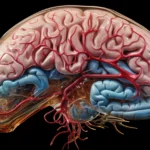
Embarking on an exploration of the intricate dynamics within relationships, this article delves into the frequently misunderstood domain of psychotic behavior.
Our journey involves understanding the nature of psychotic behavior, exploring potential causes, and examining how it can manifest within the context of relationships.
Join us as we navigate these questions and illuminate a crucial topic integral to the well-being of individuals engaged in any partnership.
What is Psychotic Behavior?
Psychotic behavior involves a significant deviation from typical thought processes and actions.
This departure often leads to a distorted perception of reality.
Individuals experiencing psychotic behavior may encounter delusions—persisting false beliefs regardless of contradictory evidence—and hallucinations—perceptions not rooted in reality.
Furthermore, extreme paranoia is another facet of psychotic behavior.
Individuals may develop an intense and irrational mistrust of others, believing they are being watched, plotted against, or persecuted. T
his heightened sense of suspicion can significantly impact interpersonal relationships, making it crucial to recognize and address these behaviors within the context of partnerships.

Potential Causes of Psychotic Behavior
To unravel the enigma of psychotic behavior, it is imperative to delve into its potential causes.
This nuanced understanding not only fosters empathy but also lays the foundation for effective communication in addressing these complex challenges.
Genetic predispositions
One potential cause of psychotic behavior lies in genetic predispositions.
Individuals may inherit a susceptibility to certain mental health conditions that can manifest as psychotic symptoms.
Understanding the genetic component provides insights into the origins of these behaviors.
Neurobiological factors
The intricate workings of the brain play a crucial role in the manifestation of psychotic behavior.
Imbalances in neurotransmitters, key players in brain communication, contribute to the development of symptoms.
A deeper exploration of these underlying mechanisms enhances our understanding of the physiological aspects associated with psychotic behavior.
Environmental influences
External factors, such as traumatic experiences, chronic stress, or substance abuse, have the potential to trigger or worsen psychotic behavior.
A comprehensive understanding of how the environment affects an individual’s mental health offers a holistic perspective on the diverse and complex nature of these behaviors.
Mental health conditions
Psychotic behavior often coexists with various mental health conditions, such as schizophrenia or bipolar disorder.
Understanding the interplay between these conditions and psychotic symptoms is crucial for accurate diagnosis and effective intervention.
Trauma and stressors
Traumatic events or chronic stress can act as catalysts for psychotic episodes.
Exploring the role of trauma in the onset of psychotic behavior emphasizes the importance of a trauma-informed approach in both diagnosis and treatment.
How Psychotic Behavior Can Manifest in Relationships

Bringing the discussion closer to home, it’s crucial to understand how psychotic behavior can manifest within the confines of a relationship.
Examining both subtle and overt manifestations provides insight into how these behaviors permeate daily interactions, potentially affecting the emotional well-being of both partners.
Erratic emotional expressions
Psychotic behavior may manifest through unpredictable and intense emotional expressions.
Partners may observe sudden mood swings or emotional responses that seem disproportionate to the situation.
Recognizing these fluctuations is key to navigating emotional dynamics within the relationship.
Distorted beliefs
Individuals experiencing psychotic behavior may hold distorted beliefs that challenge the shared reality within the relationship.
These beliefs, known as delusions, can range from paranoia to grandiosity, influencing perceptions and interactions.
Understanding and addressing these distorted beliefs are crucial for maintaining open communication.
Disconnection from reality
A noticeable manifestation of psychotic behavior is a disconnection from reality.
Partners may observe a lack of coherence in thoughts or a divergence from shared experiences.
Recognizing this disconnection allows for a more compassionate response and encourages seeking professional guidance.
Impact on interpersonal trust
Heightened paranoia, a common aspect of psychotic behavior, can impact interpersonal trust within a relationship.
Partners may grapple with unfounded suspicions or concerns, challenging the foundation of trust.
Nurturing open communication and seeking professional support can help rebuild trust in such instances.
Communication challenges
Psychotic behavior may pose challenges to effective communication.
Partners may struggle to convey their thoughts coherently or may misinterpret each other’s messages.
Developing patience and employing clear, empathetic communication strategies becomes paramount in navigating these challenges.
Impact on routine and stability
Daily routines and stability within a relationship can be disrupted by psychotic behavior.
Partners may need to adapt to unpredictable changes, requiring flexibility and understanding.
Establishing a supportive routine and seeking professional assistance can contribute to stability.
What to Do if You Think Your Partner is Psychotic

Confronting the possibility that your partner may be displaying signs of psychotic behavior can be a challenging and sensitive experience.
Navigating these moments requires a delicate balance, where understanding and support play pivotal roles.
Maintain calmness and openness
Initiate the conversation with a calm and open demeanor.
Creating a safe space is crucial, allowing your partner to share their experiences without the fear of judgment.
This establishes a foundation for a constructive and open dialogue.
Express concerns and observations
Initiate a conversation by expressing your concerns and observations.
Use “I” statements to convey your feelings rather than placing blame.
For instance, say, “I have noticed some changes in your behavior that concern me,” fostering an environment conducive to open dialogue.
Encourage professional assessment
Suggest, in a gentle manner, seeking professional help.
A mental health professional can provide an accurate diagnosis and offer appropriate guidance.
Emphasize that prioritizing their well-being is key, and seeking professional assistance is a proactive step toward understanding and addressing the challenges at hand.
Be supportive and understanding
Approach the situation with empathy and understanding.
Psychotic behavior can be distressing for both individuals involved.
Offer support, reassurance, and a willingness to navigate these challenges together.
Encourage your partner to share their feelings and experiences without fear of judgment.
Avoid confrontation and accusations
Steer clear of confrontational language or making accusations. Instead, focus on collaborative problem-solving.
Use phrases like “Let’s work together to understand and address this” to foster a sense of partnership in facing the issue.
Educate yourself
Take the initiative to educate yourself about psychotic behavior and its potential causes.
Understanding the complexities involved will enable you to approach the situation with greater knowledge and empathy.
This knowledge can also aid in providing informed support to your partner.
Seek support for yourself
Navigating these challenges can be emotionally demanding.
Don’t hesitate to seek support for yourself, whether through friends, family, or a mental health professional.
Having a support system ensures you can better assist your partner while maintaining your own well-being.
Conclusion
As we wrap up our exploration, it is crucial to emphasize the significance of recognizing and addressing psychotic behavior within relationships.
The keys to navigating this challenging terrain lie in fostering open communication, practicing empathy, and making a steadfast commitment to seeking assistance when needed.
It’s essential to remember that facing such situations does not mean you are alone; there are resources available to provide the support necessary for healing and understanding.
FAQs
While some instances may be situational, persistent psychotic behavior often indicates an underlying issue that requires professional attention.
Yes, therapeutic interventions can be effective in managing and improving psychotic behavior, especially when addressing the root causes.
Offering non-judgmental support, encouraging professional help, and maintaining open lines of communication can be instrumental in assisting a loved one.



